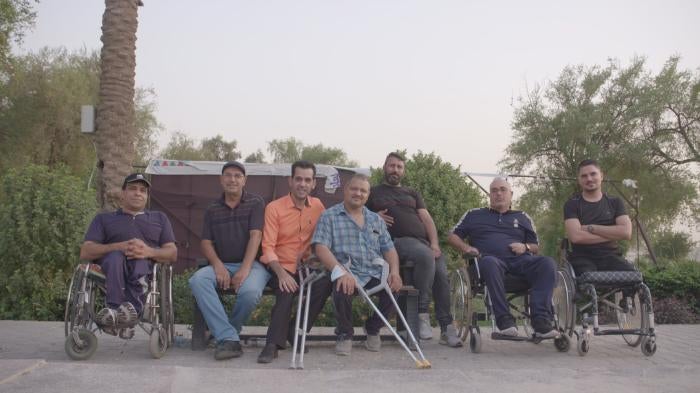Iraqi Disability Activists Pave Way to Elections
Read a text description of this video
Baghdad, Iraq
Ahmed al-Ghizzi, Director, Voice of Iraqi Disabled Association: Today I’m going to show you the difficulties we, as people with disabilities, have getting to polling places. On election day many people with disabilities are unable to come and cast their vote. Because of the hurdles, the road blocks, the inaccessible paths, the polling stations that aren’t accessible.
Peace be with you!
The city will close the roads and cars are not allowed. This situation is difficult for me and I live close by. I have friends who live much further and they won’t be able to bring their cars. This is the polling place. The booths will be on the second floor, for example, for someone in a wheelchair. Documents do not have braille.
Tahseen Ali al-Saadi, Voice of Iraqi Disabled Association: I didn’t participate in the last election because there weren’t accessible pathways to polling stations. Certainly I was very angry. I wanted to participate, get my rights and vote for the person who suits me and speaks to my aspirations. This is definitely a failure on the part of the government. They should be providing buses and election centers that are on the ground floor.
Abbas Gatea al-Gharawi, Voice of Iraqi Disabled Association: I want to be a part of society, I want to participate and I want to vote. I want to go to university, cinema, everything.
Ahmed al-Ghizzi, Director, Voice of Iraqi Disabled Association: We try to leave our fingerprints wherever we go. Wherever we go we look for what is missing for people with disabilities. And if there is no response from officials, we do it ourselves.
Tahseen Ali al-Saadi, Voice of Iraqi Disabled Association: We saw insufficient effort from the government so we had to rely on our own resources and we got together and collected [money] to set up ramps that would serve us and our friends with disabilities.
Ahmed al-Ghizzi, Director, Voice of Iraqi Disabled Association: Before the last election, we came and built a small ramp, about a meter, on this sidewalk. We took rainwater into account, so we left a gap there and built the ramp, about a meter long, so that a person can enter from this side. We were surprised on election day that they moved it. Who removed it? The city. We lost the feeling that this government cares about us. We were all hurt by this. Often what people with disabilities need is very simple. Perhaps the city could take a meter from here and build a ramp for people with wheelchairs because it’s important. They are an important part of the society and they want to live their lives normally, come close to the statue and take a picture. This is not difficult. We’ve felt that this country does not want people with disabilities or rejects them.
Tahseen Ali al-Saadi, Voice of Iraqi Disabled Association: God willing they will provide polling stations that are accessible, that are not on a higher floor and where cars can drop us off at the stations. This is our ambition, so that we can vote for the person who we think can fulfil our demands.
Abbas Gatea al-Gharawi, Voice of Iraqi Disabled Association: Elections are our future. I have to have a role in this nation. I have to vote.
It’s time for change in Iraq.
Accessibility ramps for at least 10 election polling places by 10 October.
Sign the Petition.
(Beirut, September 16, 2021) – People with disabilities in Iraq are facing significant obstacles to participating in upcoming parliamentary elections on October 10, 2021, due to discriminatory legislation and inaccessible polling places, Human Rights Watch said in a report released today. Without urgent changes, hundreds of thousands of people may not be able to vote.
The 36-page report, “‘No One Represents Us’: Lack of Access to Political Participation for People with Disabilities in Iraq,” documents that Iraqi authorities have failed to secure electoral rights for Iraqis with disabilities. People with disabilities are often effectively denied their right to vote due to discriminatory legislation and inaccessible polling places and significant legislative and political obstacles to running for office.
